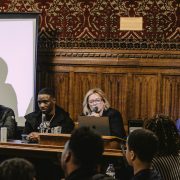“So Where Are You From?” A Question We All Know So Well

Where are you from? This is a question I get ALL the time. As a conversation opener from a stranger stood next to me on the platform (true story) as well as from people who actually play a role in my life. Doesn’t matter where I am, in the capital city or a tiny village, someone always seems to want to pop this question. Yet despite being asked this question all the time, I still never know how to answer it. Yes I am mixed race, so are you asking where my parents are from? Is it my ethnic background you’re after or do you really just want to know which geographical area I live in or grew up in?
As someone who has parents of 2 different ethnicities and races, has lived in 3 different countries and 4 different cities and multiple places within these cities there is no one easy answer to your seemingly basic question. So what do you mean?? And why does it matter so much? In fact, why does it matter so much to so many people?
I think a big part of this is wanting to define people. We naturally categorise people all the time, whether that be ooh yeah that’s that super smart girl or the really hot guy who always wears ripped jeans or that one that won’t stop talking about politics. We do it on all levels, from outer looks right down to the beliefs which someone may hold. Anyone who’s ever studied Psychology, throwback to Tajfel’s Social Identity Theory. Psychology says we all do this. We like to categorise people and in turn categorise ourselves and compare. Then we go and build our own social identity based on these social categories. Sure, categories help us to understand the world and make all that new information which comes with meeting someone new more digestible, but when our own self-esteem depends on how we perceive those around us things get a little messy.
I do believe that ethnic background has the potential to tell you a lot about someone. It can instantly tell us more about the culture of which this individual is a part of. But what happens when actually that individual has no real connection to the culture associated with their ethnic background. Take me as an example: half German, half Zambian. I was born in Germany and spent my first 7 years of life there, so I speak the German language and can very much relate to its culture. I would even say that it’s cultural practices are home to me. Now if I ever were to tell you I’m German, I am also bound to tell you that I am Zambian.
Yet I can’t speak the language and although I am familiar with the food and basic behavioural practices, I am not particularly familiar with the culture or country as a whole. Meaning your assumptions based on my ethnic background are likely to be completely wrong. Countless times have people seen my Zambian surname and made all sorts of presumptions – fellow Zambians included. Of course it’s always lovely meeting other Zambians but I’m not just a Zambian. Same with my German passport, you see the passport and instantly presume. But I am more than my German passport. I have experiences directly linked to being Zambian and ones directly linked to being German and I have others which are completely unique to being a German Zambian and experiences which don’t really depend on either of those labels. In fact, because I’ve lived in England so long, there are things which I do and say which are typically British too so what does that make me?
The problem may not lie in the question “where are you from?”, but if all you take away from that encounter is a label, you’re doing it wrong. I am more than the labels which make up part of my identity. (Do yourself a favour and check out the theory of Intersectionality because that is essentially what I’m trying to say here).
The other aspect here is belonging. I think we’ve all seen the classic “where are you really from” happen. By asking this you’ve already categorised that person into a separate group to your own. If I’m in London and say I’m from London and you throw a “really” at me, you’ve instantly thrown me out of the bubble of belonging in London. Almost claiming it as your own like you have the right to decide who belongs here and who doesn’t. Now that’s just plain rude. Belonging, just like identity, is a weird, sometimes abstract phenomenon and it’s super personal. In my opinion, belonging is down to the individual – only they can decide and know if they belong. So really, it’s none of your business.
In conclusion, all I ask is that you are more specific with your questions and take the time to really get to know someone rather than simply sticking a label on them. Culture and diversity are beautiful, so let’s take those few extra minutes to invest in really meeting someone and being open to what they have to offer as an individual. Let’s connect past the labels and meet each other as fellow human beings.
Words by Lydia Mulenga





![ZINO VINCI’S ‘FILTHY & DISGUSTING’EP BRINGS YOU TO THE CORE OF THE ARTIST [@ZinoVinci]](https://guap.co/wp-content/uploads/2023/10/Zino-4.jpg)





![Remel London’s [@Remel_London] “Mainstream” is a must attend for upcoming presenters!](https://guap.co/wp-content/uploads/2017/02/REMEL-LONDON-FLYER-FINAL-YELLOW-COMPLETE-1.png)